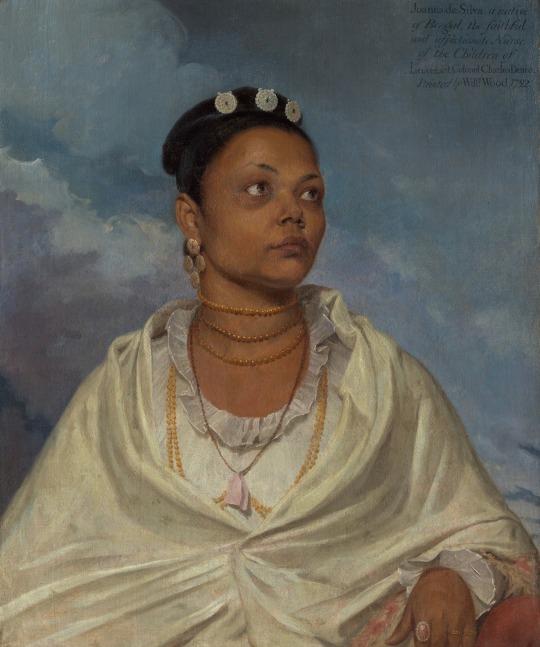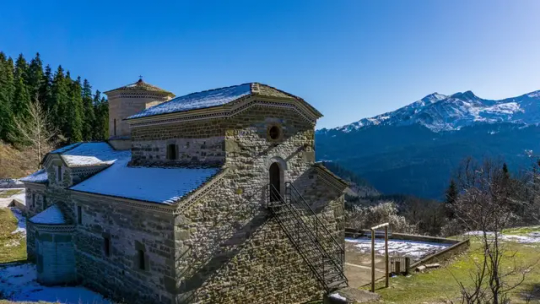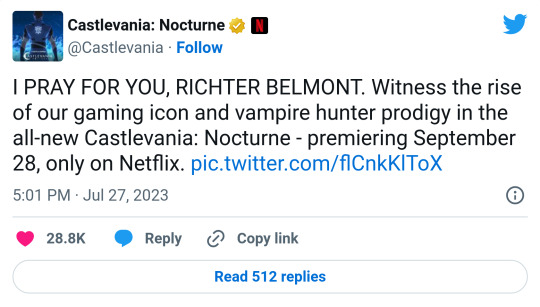#1792
Explore tagged Tumblr posts
Text

Portrait of Sir Robert Adair, Richard Cosway, 1792
From the Nelson-Atkins Museum of Art
#portrait of sir robert adair#portrait#painting#art#miniature#portrait miniature#1792#1790s#1700s#18th century#georgian#english#history#Richard cosway#cosway
30 notes
·
View notes
Text

Margaret Ann Neave, lived at Saint Peter Port on the island of Guernsey in the English Channel. The first woman who lived through three centuries, born in 1792 and passing away at 110 years old in 1902.
#reddit#historycord#diverjunior4941#1792#1902#1700s#1800s#1900s#margaret ann neave#woman#whm#photography#unknown photographer#b&w#english#england#uk#edited
17 notes
·
View notes
Text

#daily-smiling-natsume#natsume yuujinchou#natsume takashi#fujiwara touko#nyanko sensei#madara#OVA-01#1792
55 notes
·
View notes
Text

Over two years since original announcement, Neflix finally sets Castlevania: Nocturne release date.
The series will follow Richter Belmont during the French Revolution.
And according to Collider, there’s a chance Richard and Alejandra Reynoso might reprise their roles from the original series via flashbacks.
Castlevania: Nocturne premieres September 28 on Netflix.
#richard armitage#trevor belmont#alejandra reynoso#sypha belnades#richter belmont#james callis#alucard#adrien fahrenheit tepes#graham mctavish#vlad dracula tepes#dracula#wallachia#castlevania#castlevania nocturne#netflix#castlevania spin off#spin off#france#french revolution#1792#kevin kolde#clive bradley#samuel deats#adam deats#powerhouse animation#frederator studios#animation studio#collider#september 2023#news
326 notes
·
View notes
Photo

Revolt of the Parlements
The Revolt of the Parlements of 1787-1788, was the climax of a power struggle between the royal authority of King Louis XVI of France (r. 1774-1792) and the Parlement of Paris, the most powerful of France's thirteen parlements, or high judicial courts. The parlement's resistance to the king's financial reforms forced the king to summon a meeting of the Estates-General.
France's financial crisis, rooted in decades of lavish spending as well as a disjointed system of taxation, drove the king to turn to the parlements in 1787 with his reforms since they claimed the authority to register any royal edict. These courts had a history of opposing the French monarchy stretching back to the Fronde Rebellion (1648-1653), and they resisted, declaring that only an Estates-General could approve such measures. The resulting power struggle became a battle against the principle of absolutism, occurring as French finances, already at a critical point, continued to worsen.
The Revolt of the Parlements was a major clash between the king and estates of France in the leadup to the French Revolution (1789-1799). Since the most important of the king's reforms were never realized, France became bankrupt, hastening the meeting of the Estates-General in 1789 as well as the start of the Revolution.
Background: Parliamentary Power
France's 13 parlements were the highest judicial courts in the kingdom, second in authority only to the king himself. They varied wildly in jurisdictional size, with the largest and most powerful, the Parlement of Paris, having jurisdiction over a third of the kingdom. The parliamentarian judges, of which there were at least 12 to a court, were mostly aristocratic, although a good portion had been wealthy bourgeoisie who purchased their offices, becoming ennobled in the process. This subset of administrative aristocrats became known as the nobility of the robe. Despite consisting of mostly members of the Second Estate, parlements claimed to represent all three estates of pre-revolutionary France in the absence of an Estates-General. Since the Estates-General, a representative body of all three estates called at the pleasure of the king, had not met since 1614, the parlements took its authority for themselves.
Parlements checked the king's authority and exerted their own, through their power of registration. Although they had no legislative powers of their own, the parlements claimed the right to scrutinize and register any new laws or edict the king wished to pass, reserving the authority to reject any edict they did not like. When refusing to register an edict, the parlements would publish remonstrances, or written explanations of their grievances against the policy. As an absolutist monarch, the king retained the right to register his edicts without parlement consent. He could do this by issuing a lit de justice, which required he attend a session of parlement where he would force a registration.
As the parlements grew in power, they began to question the legality of lits de justice and sometimes declared such forced registrations to be illegal, in which case, the parlement would be temporarily exiled from its seat of power by order of a lettre de cachet, a writ ensuring the king's will be carried out. The legality of both lits de justice and lettres de cachet would be widely questioned by the time of Louis XVI.
Since the failed Fronde Rebellion against Louis XIV of France (r. 1643-1715), the parlements maintained a long tradition of resisting the king's authority, especially on fiscal matters. In the final years of the reign of Louis XV of France (r. 1715-1774), they had grown so comfortable blocking royal edicts that the king found it difficult to get anything done. Spearheaded by his chancellor, René de Maupeou, Louis XV's government dissolved the Parlement of Paris in 1771 and worked to create an entirely new system of parlements more agreeable to his political agenda. All this was undone when a young and impressionable Louis XVI came to the throne in 1774, who would fire Maupeou and restore power to the parlements, a decision he would undoubtedly come to regret.
Continue reading...
15 notes
·
View notes
Text
August 10, 1792: The Real "Good" Revolution Begins

La prise des Tuileries le 10 août 1792 painting by Jacques Bertaux,
How refreshing it is to be on Tumblr, far from the clichés of movies and pseudo-historians thank you to everyone . In my view , the true beginning of the social revolution starts around this time. Finally (though temporarily), France fought for real equality between people of different colors. However, this social revolution was very limited (an understatement) across the political spectrum, particularly concerning property rights—even those considered ultra-revolutionary and the Babouvists, were timid on this front—and other rights as well. In fact you understand that part of my speech is my point of view some would told me that start in reality in 1791.
On the other hand, those who believe that the revolution of 1789 was the good one and that 1792 was bad because of the increased violence are entirely mistaken. The revolution didn't wait for the Montagnards to start beheading people. We must remember that the governor of the Bastille, Delaunay, was lynched by the crowd. The same fate befell Foulon. There was the repression during the Nancy affair, where one person was condemned to the punishment of the Wheel, the repression of the Haitian Revolution that began in 1791, the Champ de Mars massacre... In short, what is considered the second revolution had its violent episodes, but so did the first. And let's not forget that such violence already existed under absolute monarchy, where we could witness what would today be considered deliberate criminal negligence, such as in the case of the Beast of Gévaudan, the deliberate repressions by Louis XIV or Louis XVI, the repression of the Flour War, and so on.
32 notes
·
View notes
Text

Discovery and Chatham Approaching Cape Flattery, 29 April 1792,by Christopher Blossom (1956-)
125 notes
·
View notes
Text


Good times wit my OGs
13 notes
·
View notes
Text

Oil painting, 1792, British.
Portraying Joanna de Silva in a white dress and cream shawl.
Painted by William Wood.
Met Museum.
#1792#1790s#1790s dress#1790s painting#1790s britain#Britain#shawl#Joanna de silva#William wood#met museum
29 notes
·
View notes
Text
Due to the lethal nature of the games, the Triwizard Tournament was canceled after the 1792 games and not reinstated until 1994 with new safe guards in place to hopefully prevent deaths. (Harry Potter and the Goblet of Fire, Bk)

#nerds yearbook#paranormal#hp#harry potter#triwizard tournament#1792#1994#jk rowling#harry potter and the goblet of fire#book#novel
5 notes
·
View notes
Text



Designs for Printed Cotton, by William Kilburn, English, 1788-92
From the Victoria & Albert Museum
#design#fabric#printed cotton#William kilburn#english#1788#1792#1780s#1790s#1700s#18th century#georgian#textile#history
33 notes
·
View notes
Text

Η μονή της Αγίας Παρασκευής,κοντά στο Νεραϊδοχώρι,Τρικάλων
Το μοναστήρι της αγίας Παρασκευής κτίστηκε το 1792 απ' το Γιώργο ή Γούσιο Χατζηπέτρο δίπλα στο εκκλησάκι της Μεταμόρφωσης του Σωτήρα, που πιθανότατα ήταν κτισμένο πριν απ' το 1792. Είναι βασιλικού ρυθμού με τρούλο.
Το μοναστήρι είχε πρόβατα, γίδια, γελάδια και χωράφια. Τα χωράφια καλλιεργούσαν κοληγάδες (δηλ. άτομα που έπαιρναν το 1/2 ή το 1/3 της παραγωγής, μισακάρηδες ή τριτάρηδες). Την επίβλεψη έκαναν οι ηγούμενοι και οι καλόγηροι που έμεναν στα κελιά του μοναστηριού και ξεπερνούσαν τα 30 άτομα. Ώς ηγούμενοι αναφέρονται ο Δαμασκηνός, ο Ευλόγιος, Κήριλος και ο Χριστόφορος. Ώς καλόγηροι αναφέρονται ο Γεννάδιος και ο Νεόφυτος το 1911. Η διαμόρφωση του χώρου του μοναστηριού έγινε το 1977 με δωρεά του Κλέαρχου Δημητρίου και η πέτρινη βρύση κτίστηκε το 1980 με τη φροντίδα του παπα-Χρήστου.
#μοναστήρι#Αγία Παρασκευή#Νεραιδοχώρι#Τρίκαλα#ιστορία#ορεινό χωριό#Agia Paraskevi#Neraidohori#Trikala#Greece#mountain village#monastery#old monastery#1792#snow on the roof
3 notes
·
View notes
Text

#richard armitage#trevor belmont#alejandra reynoso#sypha belnades#richter belmont#james callis#alucard#adrien fahrenheit tepes#graham mctavish#vlad dracula tepes#dracula#wallachia#castlevania#castlevania nocturne#netflix#castlevania spin off#spin off#france#french revolution#1792#kevin kolde#clive bradley#samuel deats#adam deats#powerhouse animation#frederator studios#animation studio#september 2023#official trailer#news
239 notes
·
View notes
Photo

Anthony Wayne
Anthony Wayne (1745-1796), better known by his nickname 'Mad Anthony', was a brigadier general of the Continental Army during the American Revolutionary War (1775-1783). After the war, he briefly served in Congress before resuming his military career, winning a victory over a coalition of Native American nations at the Battle of Fallen Timbers.
Born in Pennsylvania to a family of Irish immigrants, Wayne worked as a land surveyor before joining the Continental Army in 1776. Within a year, he had become a brigadier general, serving with distinction in the Philadelphia Campaign. His finest moment came in July 1779, when he led a nighttime raid against the British garrison at Stony Point, New York, capturing the fort even after sustaining a bullet wound to the head. After the American Revolution, Wayne won election to the House of Representatives as a member of the Federalist Party, working to help strengthen the authority of the federal government. In 1792, he became Senior Army Officer and defeated the Northwestern Confederacy of Native American nations that were contesting the United States' control of the Northwest Territory (modern Ohio). Wayne died shortly after his victory at Fallen Timbers on 15 December 1796, at the age of 51.
Early Life
Anthony Wayne was born on 1 January 1745 at his family's estate of Waynesborough in Easttown, Pennsylvania. He came from a family of Irish Protestants, and his grandfather had fought for the Williamites at the Battle of the Boyne (1 July 1690). In the early 1700s, the Wayne family emigrated from Ireland to the British colony of Pennsylvania, where Anthony's father, Isaac Wayne, found work as a tanner; over the decades, his tannery became the largest in Pennsylvania. In 1739, at the age of 40, Isaac Wayne married Elizabeth Iddings. The couple would have four children, of whom Anthony was the eldest. During the French and Indian War (1754-1763), Isaac served as a captain and raised a company of provincial soldiers. He participated in the 1758 Forbes Expedition to capture Fort Duquesne, in which he served alongside a young Colonel George Washington.
Growing up, Anthony Wayne was expected to inherit the 500-acre Waynesborough and work the fields as a farmer. But Wayne had other plans for his future; having listened to heroic tales of his grandfather's and father's military service as a child, the young Anthony dreamt of winning military glory himself. An insatiable reader, Wayne read all the military histories and classical works he could get his hands on and was soon able to recite both Julius Caesar and William Shakespeare. After completing his education at the College of Pennsylvania, Wayne became a land surveyor. In 1765, he and several of his associates were commissioned by Benjamin Franklin to survey 100,000 acres of land in Nova Scotia. After Wayne surveyed the land, which became the township of Monckton, it was settled by eleven Pennsylvania families of mostly German origin.
In 1763, Wayne married Mary Penrose. The couple had two children: a daughter Margarette (b. 1770) and a son, Isaac (b. 1772). Wayne and his growing family continued to live at Waynesborough, where he split his time between helping his father at the tannery and his own work as a surveyor. But, as relations between the Thirteen Colonies and Great Britain continued to deteriorate, Wayne found that he was being drawn toward the Patriot movement, which opposed the 'unjust' policies of the British Parliament such as taxation without colonial representation. In 1775, a year after the death of his father, Wayne was nominated to the Pennsylvania Committee of Safety, a shadow government run by American revolutionaries; on this committee, he served alongside prominent Patriot leaders like Benjamin Franklin and John Dickinson.
In this position, Wayne became increasingly radical in his disdain for the British, leading his primarily Quaker constituents to remove him from the committee in October, for fear that he had become too war hawkish. By now, the American Revolutionary War was underway and rapidly escalating. With his brief foray into politics over, Wayne could now follow his childhood dream and enter the military.
Continue reading...
15 notes
·
View notes
